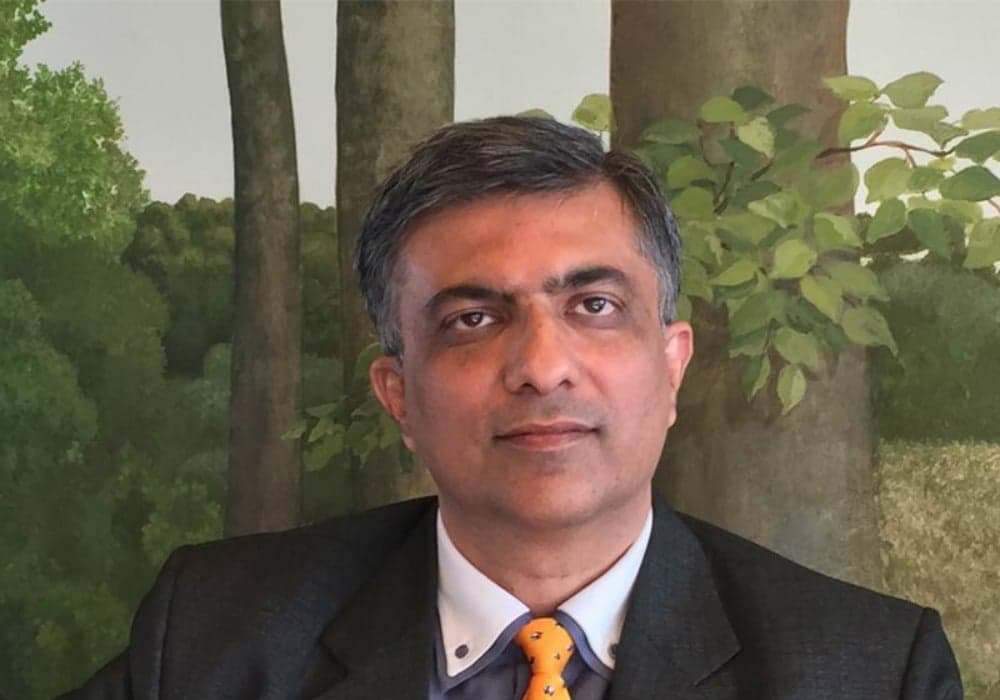Rajiv Aggarwal Took Over As Joint Secretary Of DIPP In 2015, Worked Extensively On Startup-Friendly IPR Policies
The Department of Industrial Policy and Promotion (DIPP) has been designated to execute the Modi Government’s ‘Startup India, Stand Up India’ mission. As such, the Startup India, Stand Up India mission requires the creation of startup founders who leverage intellectual property (IP) to increase job creation and bring in more revenue for the economy. Intellectual Property Rights (IPR) including Patent and Trademark, are major concerns for a startup to maintain its sanctity as an innovative company.
Rajiv Aggarwal, is the Joint Secretary, Department of Industrial Policy & Promotion (DIPP), Ministry of Commerce & Industry. He has been designated to ensure the protection of IP rights at the policy level. Working at the policy and CGO (technical and field level) has given Rajiv Aggarwal a unique perspective when it comes to the evolution of IPR in India. He recounts that he entered DIPP two years ago. At the time, he was assigned the job at IPR (Intellectual property rights) desk and there was no looking back. His first few months were spent holding the position of Controller General of Patents, Designs and Trademarks. He worked at the policy level and CGO (technical and field) which gave him an overview of both the fields.
Inc42 recently got a chance to catch up with Rajiv Aggarwal, when he spoke to the team extensively about the existing IPR workflow under DIPP, policies and the way forward.
Here are edited excerpts from our conversation.
Inc42: What led to the need of introducing an IPR Policy?
Rajiv Aggarwal: The government came up with the International IPR Policy last year. India has a well-established administrative and judicial system in place to safeguard IP rights. We realised that we have a required paraphernalia, the necessary structure, but we need to spell out a vision. So, the policy which was introduced last year, served as a vision document for the way we would like to move ahead.
Secondly, if we talk about IPR, we may claim that they are compliant, but if the cases are not being processed in due-time, then the entire process becomes meaningless.
Until two-years-ago, there was a huge backlog of patent and trademark applications. This was a challenge for the department. For example – a patent application took five to seven years to be considered for the first examination after filing. A patent’s life is 20 years from the date of application. This entire process, even without an opposition may take 8-10 years. This provides an unacceptable scenario, where half of the patent life is consumed in regulatory approvals. While in other countries the time period is two-three years.
Manpower unavailability was one of the biggest reasons for this delay. The department did not have sufficient patent examiners. The first task was to increase the manpower.
Inc42: What are the various initiatives taken by the IPR division in the past year?
Rajiv Aggarwal: At the fundamental level, to solve the problem of lack of manpower of the department devised and designed a two-stage exam and the responsibility was given to an independent body to keep the process under secrecy.
Through this process, we managed to recruit 459 new patent examiners. We earlier had 130 examiners. And now 400 of these examiners are carrying out substantive examination work. This has substantially increased the number of examination reports being issued. By 2018-19 we are hoping the time period of seven to eight years will reduce up to 18 months.
Another problem was on the trademark front. The examination took 13 months-15 months after filing. Through augmentation of manpower and process re-engineering, we have managed to reduce it to less than a month.
The second change in trademarks is about application rejection. Earlier, 90%-95% of trademark application were being objected. With training, sensitisation, and orientation the acceptance range has been increased to 25%-30%. Trademark examination and registration for trademark went up to 4 times from 60,000 to a massive 2.5 Lakhs.
We have managed to bring down the pendency dramatically. We have also re-engineered a lot of other processes. For instance, patents were earlier required to file a reply in a year and now that has been reduced to six months. Adjournments have been limited, certain restrictions and timelines, have been put in place. You can expedite your process if you are a startup. These changes are now being implemented.”
The government currently provides 80% rebate to startups for application process of patents and 50% rebate to startups under MSMEs/SMEs for a trademark. These changes have helped to galvanise the startup ecosystem and push through the growth.
Inc42: What were some of the major challenges you faced during your tenure at DIPP?
Rajiv Aggarwal: Undoubtedly preparing a policy is easier, but the implementation is hard. There were no major roadblocks or impediments. I would agree that it does take time, despite the best of efforts.
The DIPP and other related bodies maintain regular interactions with their stakeholders in order to get more feedback. The officials have interactions and everything is updated on the website without hiding anything. This has helped us to move in the right direction. So even if it takes time, if an individual is moving forward in the right direction, it will bear fruit.
Changes in the amendment of patent rules last year and the trademark rules this year were not a quick decision. It was done with precision. The team took a lot of time to formulate the rules. A full month was spent on analysing if these policies or changes were worth a shot or not. Each comma, each word in these policies can make a difference.
Inc42: Under the ‘Make In India’ campaign what are the initiatives taken for IPR protection conducive to startups?
Rajiv Aggarwal: On the IP front, as already mentioned, the main challenge was the procedure. That is something we still have to tackle. And, hopefully, things will get streamlined by this year.
On the startups front, the Startup India programme was launched by PM Narendra Modi. We are currently looking at the issues in the policy and making changes on the basis of feedback. For example, last year we specified the definition of a startup.
The major problem that came to our notice was getting a letter of recommendation from an incubator was a difficult task for startups. So, we made sure to do-away with the ‘letter of recommendation.’ Startups are not just about path-breaking innovations. They are also about creating jobs, wealth creation, and having a scalable model. So, accordingly, the definition of startups has been tweaked.
Inc42: Is there an impact on the expansion and strengthening of IP Rights?
Rajiv Aggarwal: There is anecdotal evidence. Yes, the impact is there, but it is too early to do a study to prove it. As we move along, we have created a cell for IPR promotion and management. We have reached out to schools and the response is tremendous. Then, the next stop was colleges and universities where the response was more advanced.
The department has also facilitated these programmes in industry clusters. The department goes down to basic levels, like how to prepare a patent application etc. After organising these awareness programmes we were able to identify the gaps. The department is now planning to hold over 4,000 awareness programmes in the next three years, to make students and industry aware of their own rights.
Secondly, we launched a programme for startups, wherein if they have to file a patent, trademark, design, all they have to do is identify one of the facilitators. Approach any of them and fill an application and they will prosecute it further. The government, currently, has about 1,000 facilitators listed on its website. The agent fee will be paid by the government, the startups only have to bear the cost of the statutory fees payable.
Inc42: Has the government put a cap on facilitator fee?
Rajiv Aggarwal: Yes, we have fixed a fee. Facilitators are happy to be a part of the initiative. Even if the amount is more or less they are still having customers and are also getting a chance to build loyalty.
Inc42: What has the government done for extending IPR awareness in rural India?
Rajiv Aggarwal: When it comes to awareness on IP, for villagers, the government is reaching out to them via advertisements and mass media. For example – Jaago Grahak Jaago (Wake up, customer!) campaign helps to educate the consumer against counterfeit products. That is also a part of IP.
Apart from this, there are a lot of grassroots innovators through the National Innovation Fund or other programmes. Those are focussed organisations working in a particular sector.
The government is trying to promote geographical indications where farmers and artisans have a major stake. If they have some knowledge that has passed through generations we are trying to protect these handlooms or handicrafts through a GIS tag. (GIS is a geographic information system designed to capture, store, manipulate, analyse, manage, and present all types of geographical data.) Once the protection is in place, then the government focusses on linking them to the market, to monetise and commercialise them.
Inc42: What steps has the DIPP taken to provide them with this platform?
Rajiv Aggarwal: For example, a product like Darjeeling Tea is getting marketed on its own. But, black pottery from Nizamabad can not manage market on its own. So, the government is reaching out to e-markets to commercialise these products – through the GIS system.
The government recently held an exhibition of these GIS products abroad to give them a recognition. India has a lot of GIS products and a GIS act. A few artisans also performed live over there to showcase their talent and it was an eye opener for the WIPO.
The best part was that the villagers and artisans got a lot of exposure, and managed to understand the economics. They also managed to make some money out of it.
GIS product makers need to be provided with an orientation about how the market works and how to handle accounts. The government is looking forward to implementing such programmes in the near future.
Inc42: Can you share a few milestones regarding the IPR system implemented by the DIPP?
Rajiv Aggarwal: In the past 20 years, there have been a lot of shifts. A lot of new acts have been introduced, GIS illustration and a traditional knowledge digital library was also introduced. The famous haldighati, because of which the US patent on turmeric was revoked; these are some of the milestones in our journey.
The increase of manpower, as discussed before, is also a milestone. Two years ago, only 30% of patent applications were filed. Last year, the number shot up to 80%.
We have differential pricing to promote digital filing of patent applications. There is a 10% difference in electronic and physical application filing. We have introduced it in trademark filings as well.
Reducing trademark examination time to a month was also another milestone. Patent examination to 18 months by 2018 is also a goal we have set for ourselves.
Interaction with the WIPO has increased and summer school has been planned for anyone who wants to learn about IP. There are still a lot more changes to come. This will take India to the next level.
With all of these policies in place, startups did get a boost. As per the most recent status report, dated July 17, 2017, a panel of 423 facilitators for patent and design applications and 596 facilitators for Trademarks applications has been constituted for assistance in filing Intellectual Property (IP) applications. Overall, more than 470 Startups have benefitted from the scheme.
Talking about the future of IPR in India, Rajiv emphasised that Indians by nature are very creative and innovative. He further added that somehow, Indians instigate themselves to follow the herd mentality. So, the dream for the DIPP would be to see people nurturing their streak of creativity and recognise their potential. He aptly concludes with, “We do not have to blindly follow people. We have a vast pool of talent, our ethos, and we should build out ideas on those.”
































 Ad-lite browsing experience
Ad-lite browsing experience